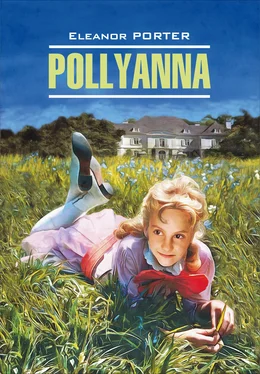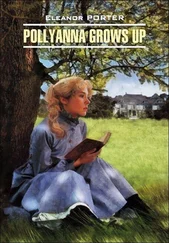The Man always spoke to Pollyanna after this, and frequently he spoke first, though usually he said little but “good afternoon.” Even that, however, was a great surprise to Nancy, who chanced to be with Pollyanna one day when the greeting was given.
“Sakes alive, Miss Pollyanna,” she gasped, “did that man SPEAK TO YOU?”
“Why, yes, he always does – now,” smiled Pollyanna. “‘He always does’! Goodness! Do you know who – he – is?” demanded Nancy.
Pollyanna frowned and shook her head.
“I reckon he forgot to tell me one day. You see, I did my part of the introducing [67] I did my part of the introducing – ( разг. ) я ему представилась
, but he didn’t.”
Nancy’s eyes widened.
“But he never speaks ter anybody, child – he hain’t for years, I guess, except when he just has to, for business, and all that. He’s John Pendleton. He lives all by himself in the big house on Pendleton Hill. He won’t even have any one ’round ter cook for him – comes down ter the hotel for his meals three times a day. I know Sally Miner, who waits on him, and she says he hardly opens his head enough ter tell what he wants ter eat. She has ter guess it more’n half the time – only it’ll be somethin’ CHEAP! She knows that without no tellin’.”
Pollyanna nodded sympathetically.
“I know. You have to look for cheap things when you’re poor. Father and I took meals out a lot. We had beans and fish balls most generally. We used to say how glad we were we liked beans – that is, we said it specially when we were looking at the roast turkey place, you know, that was sixty cents. Does Mr. Pendleton like beans?”
“Like ’em! What if he does – or don’t? Why, Miss Pollyanna, he ain’t poor. He’s got loads of money, John Pendleton has – from his father. There ain’t nobody in town as rich as he is. He could eat dollar bills, if he wanted to – and not know it.”
Pollyanna giggled.
“As if anybody COULD eat dollar bills and not know it, Nancy, when they come to try to chew ’em!”
“Ho! I mean he’s rich enough ter do it,” shrugged Nancy. “He ain’t spendin’ his money, that’s all. He’s a-savin’ of it. [68] He’s a-savin’ of it. – ( искаж. ) Он копит их.
”
“Oh, for the heathen,” surmised Pollyanna. “How perfectly splendid! That’s denying yourself and taking up your cross. I know; father told me.”
Nancy’s lips parted abruptly, as if there were angry words all ready to come; but her eyes, resting on Pollyanna’s jubilantly trustful face, saw something that prevented the words being spoken.
“Humph!” she vouchsafed. Then, showing her old-time interest, she went on: “But, say, it is queer, his speakin’ to you, honestly, Miss Pollyanna. He don’t speak ter no one; and he lives all alone in a great big lovely house all full of jest grand things, they say. Some says he’s crazy, and some jest cross; and some says he’s got a skeleton in his closet [69] he’s got a skeleton in his closet – ( разг. ) у него скелет в шкафу (он скрывает какую-то тайну)
.”
“Oh, Nancy!” shuddered Pollyanna. “How can he keep such a dreadful thing? I should think he’d throw it away!”
Nancy chuckled. That Pollyanna had taken the skeleton literally instead of figuratively, she knew very well; but, perversely, she refrained from correcting the mistake.
“And EVERYBODY says he’s mysterious,” she went on. “Some years he jest travels, week in and week out, and it’s always in heathen countries – Egypt and Asia and the Desert of Sarah, you know.”
“Oh, a missionary,” nodded Pollyanna.
Nancy laughed oddly.
“Well, I didn’t say that, Miss Pollyanna. When he comes back he writes books – queer, odd books, they say, about some gimcrack he’s found in them heathen countries. But he don’t never seem ter want ter spend no money here – leastways, not for jest livin’.”
“Of course not – if he’s saving it for the heathen,” declared Pollyanna. “But he is a funny man, and he’s different, too, just like Mrs. Snow, only he’s a different different [70] he’s a different different – ( разг. ) он по-другому другой
.”
“Well, I guess he is – rather,” chuckled Nancy.
“I’m gladder’n ever now, anyhow, that he speaks to me,” sighed Pollyanna contentedly.
Chapter X
A Surprise for Mrs. Snow
The next time Pollyanna went to see Mrs. Snow, she found that lady, as at first, in a darkened room.
“It’s the little girl from Miss Polly’s, mother,” announced Milly, in a tired manner; then Pollyanna found herself alone with the invalid.
“Oh, it’s you, is it?” asked a fretful voice from the bed. “I remember you. ANYbody’d remember you, I guess, if they saw you once. I wish you had come yesterday. I WANTED you yesterday.”
“Did you? Well, I’m glad ’tisn’t any farther away from yesterday than to-day is, then,” laughed Pollyanna, advancing cheerily into the room, and setting her basket carefully down on a chair. “My! but aren’t you dark here, though? I can’t see you a bit,” she cried, unhesitatingly crossing to the window and pulling up the shade. “I want to see if you’ve fixed your hair like I did – oh, you haven’t! But, never mind; I’m glad you haven’t, after all, ’cause maybe you’ll let me do it – later. But now I want you to see what I’ve brought you.”
The woman stirred restlessly.
“Just as if how it looks would make any difference in how it tastes [71] how it looks would make any difference in how it tastes – ( разг. ) можно подумать, внешний вид еды влияет на ее вкус
,” she scoffed – but she turned her eyes toward the basket. “Well, what is it?”
“Guess! What do you want?” Pollyanna had skipped back to the basket. Her face was alight. The sick woman frowned.
“Why, I don’t WANT anything, as I know of,” she sighed. “After all, they all taste alike!”
Pollyanna chuckled.
“This won’t. Guess! If you DID want something, what would it be?”
The woman hesitated. She did not realize it herself, but she had so long been accustomed to wanting what she did not have, that to state off-hand what she DID want seemed impossible – until she knew what she had. Obviously, however, she must say something. This extraordinary child was waiting.
“Well, of course, there’s lamb broth – ”
“I’ve got it!” crowed Pollyanna.
“But that’s what I DIDN’t want,” sighed the sick woman, sure now of what her stomach craved. “It was chicken I wanted.”
“Oh, I’ve got that, too,” chuckled Pollyanna.
The woman turned in amazement.
“Both of them?” she demanded.
“Yes – and calf’s-foot jelly,” triumphed Pollyanna. “I was just bound you should have what you wanted for once; so Nancy and I fixed it. Oh, of course, there’s only a little of each – but there’s some of all of ’em! I’m so glad you did want chicken,” she went on contentedly, as she lifted the three little bowls from her basket. “You see, I got to thinking on the way here – what if you should say tripe, or onions, or something like that, that I didn’t have! Wouldn’t it have been a shame [72] Wouldn’t it have been a shame – ( разг. ) Правда, было бы ужасно жалко
– when I’d tried so hard?” she laughed merrily.
There was no reply. The sick woman seemed to be trying – mentally to find something she had lost.
“There! I’m to leave them all,” announced Pollyanna, as she arranged the three bowls in a row on the table. “Like enough it’ll be lamb broth you want to-morrow. How do you do to-day?” she finished in polite inquiry.
Читать дальше
Конец ознакомительного отрывка
Купить книгу












